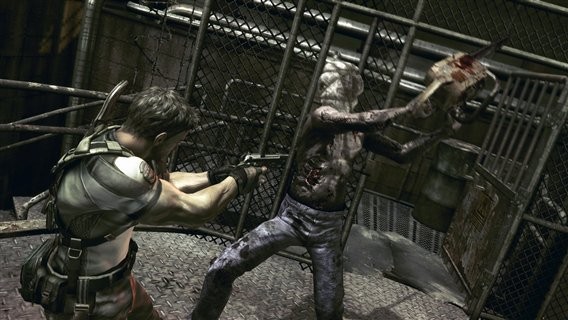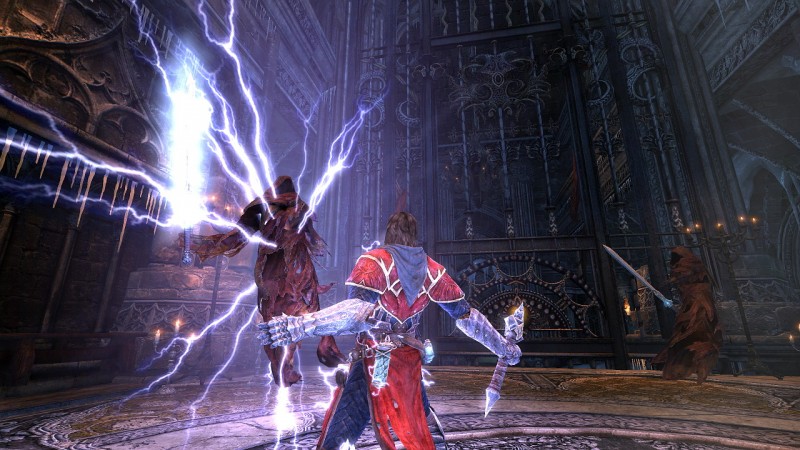Please support Game Informer. Print magazine subscriptions are less than $2 per issue
Our Top 25 Games Of Last Generation Snubs List

When you make a list, you’re bound to upset a few people. That’s true whether you’re calling out the best Xbox 360 games, PS3 titles, or Wii releases, as we’ve been doing. Everyone has an opinion; if you’re not putting a particular game too high in your rankings, you’re placing it too low. Even worse, there's the distinct possibility that you've left a deserving game off entirely. Cutting our lists down to 25 entries was a painful process, and nearly all of the editors championed a personal favorite but failed.
That’s where our snubs list comes in. Here’s where the Game Informer editors are able to not only call out what they see as our biggest oversights, but articulate why they believe their favorite games should have made the cut.
Splinter Cell: Conviction (2010)
Ben Reeves
I was one of Splinter Cell’s early adopters; I bought the first entry on day one. Even though the game was fairly unforgiving when you failed to stay in the shadows, I still loved shooting out the lights and snapping necks as Sam Fisher saved the world, day in and day out. However, after several entries, the series' slow-paced shadow stalking began to wear thin. Enter Splinter Cell: Conviction, which stripped away most of Splinter Cell’s tired mechanics and reinvented the series to be a faster, more action-packed spy thriller. Conviction was still a stealth game, but instead of punishing players for failing to stay hidden, it rewarded those who blended into their environment. The mark-and-execute system not only encouraged players to sneak past their foes, but it made it easy to cover up your mistakes. I also loved interrogating thugs for information and the way the game seamlessly transitioned between levels. It’s hard to make a top 25 list that appeases everyone, but Splinter Cell: Conviction is firmly cemented in my personal top 25 list of best games from last generation.
(Read our full review here)
Alan Wake (2010)
Mike Futter
Remedy's original tale of a writer plagued with demons both real and imagined is an exploration of light and shadow and of hope and demons. As Alan searches for his wife, who has mysteriously disappeared (along with their vacation cabin in the Pacific Northwest), he unravels a mystery that is bigger than himself. The narrative structure sees players finding pieces of Alan's manuscript that foreshadow events, and the use of light as a gameplay mechanic is unique and thematic. Stephen King hasn't dipped too heavily into gaming, but if he did, I suspect that we'd see some similarities to Alan Wake. The game is so loved by fans that studio creative director Sam Lake took to video to talk about a possible sequel.
(Read our full review here)
Heavy Rain (2010)
Matthew Kato
Often, games present their stories merely as devices to deliver gameplay, but Heavy Rain effectively mixes both to embroil players in its mystery. It also represents one of those uncommon moments when a game’s graphics and ability to convey a mood demarcate it from the crowd. Heavy Rain guides players through the lives of four playable characters who each bring their perspective to the mystery of the Origami Killer. The game strikes a fine balance between its quick-time event-based gameplay, FBI investigations (as hokey as Jayden Norman is), and story events to propel players through a tale which evokes feelings of loss, action-fueled adrenaline, and suspense. The various choices you make on behalf of the characters are a central aspect to the game. Whether it’s something as big as failing a police chase and getting arrested or as small as exploring the nuances of a character’s daily life, the game does a great job of involving the player without losing its own story thread (despite some plot holes). The simple contextual button presses work in conjunction with the cinematic presentation to imbue meaning and drama in torture scenes and everyday life alike. With Heavy Rain, David Cage and Quantic Dream created a moment on the PlayStation 3 that I believe will be chased and replicated in successive generations.
(Read our full review here)
Resident Evil 5 (2009)
Tim Turi
Resident Evil 4 simultaneously reinvented the series and changed how we play third-person shooters forever. This sequel gave fans more of the same while letting them blast away zombies and mutant insects with a friend in co-op. Some criticized the game for not letting players move while shooting like in Dead Space, but those who looked past that design decision were treated to a bombastic, satisfying trek through an infected African landscape. Resident Evil 5 should be remembered as one of the best co-op experiences of last generation.
(Read our full review here)
Limbo (2010)
Kyle Hilliard
The ambiguous nature of Limbo's world and story, its perfectly executed collection of puzzles, and its engaging art style that set it apart from other games immediately pulled me in and honestly still hasn’t let me go. Even though I know all the puzzle solutions and every beat of what little story exists, I still find myself totally enraptured on every playthrough. The game is among the collection of definitive titles associated with the new wave of independent success stories that took off during the previous generation, and it deserves to be among the best games of the previous generation. Even if it couldn’t quite crack the top 25.
(Read our full review here)
Valkyria Chronicles (2008)
Matt Miller
While it never got the attention it deserved, Valkyria Chronicles is a refreshing and rewarding integration of tactical gaming and classic Japanese role-playing and one of the bright points of the PlayStation 3 library. The alternate-history World War II setting was the first of many features that set Sega’s game apart. Anime-styled cutscenes were beautifully crafted, presenting an impressive ensemble of characters with distinct personalities and developing relationships. Pre-dating the revival of XCOM: Enemy Unknown by several years, Valkyria Chronicles allowed for deep strategic gameplay that used cover, range, and character special abilities to provide tremendous choice in how to tackle a mission. Each of Valkyria Chronicles’ missions felt distinct from the last, encouraging stealth in one sequence, only to follow it up with a destructive tank battle a few minutes later. A touching score was a perfect accompaniment to in-game graphics, which presented a pencil-drawn aesthetic that was both highly engaging and different from other anime-themed projects releasing around the same time. Stellar critical response wasn’t enough to give Valkyria Chronicles the sales boost it needed, and later PSP installments failed to capture the same magic. Even so, that first installment remains one of my personal high points of gaming with my PS3, and I keep wishing that Sega would give the franchise one more shot.
(Read reviews editor Joe Juba's enthusiastic support for the game here)
Mortal Kombat (2011)
Andrew Reiner
NetherRealm Studios is just as skilled at breathing new life into an old series as it is ending the life of the famed combatants that put it on the map. The series' trademark gore is every bit as cringe-inducing and hilarious as it has been since the arcade heyday, but the combat gives players a wider range of strategy on the 2D plane. While sweeps and uppercuts remain, new depth comes from the brutal combos, juggles, and special attacks that zoom in to give the player an intimate X-ray look at a combatant's cracking bones. None of the characters are palette swaps, and each is equipped with a handful of ways to finish their foes. Mortal Kombat's excitement extends to the unique avenues of play, such as Challenge mode, a tower of unique one-off battles that range from Johnny Cage fighting a movie director he hates to characters trying to keep their lunch down as they take on a rotting version of Goro. No matter how you hack it up, this is the best Mortal Kombat to date.
(Read our full review here)
Final Fantasy XIII (2010)
Joe Juba
Final Fantasy XIII is a divisive title, but don’t let the arguments drown out the fact that this is an exceptional RPG in many ways. The redesigned battle system puts a thrilling strategic twist on battle, giving players more control over the flow of an encounter rather than micromanaging individual actions. The graphics are gorgeous, and the world has a deep (if convoluted) mythology that is even further explored in Final Fantasy XIII-2 and Lightning Returns. FF XIII is one of the landmark RPGs of the last generation, and deserves some love despite the fact that it wasn’t what fans were expecting.
(Read our full review here)
Dragon Age: Origins (2009)
Kimberly Wallace
The PC version might have been superior, but that doesn’t take away from the greatness of Dragon Age: Origins. BioWare carefully crafted a world with interesting dilemmas, and Origins quickly became one of my favorite games last generation. Dragon Age was about issues and arguments; you could debate any point and still sound reasonable. It also had some brilliant character interactions to boot. These characters tested how you felt about certain dilemmas; maybe you thought Morrigan was right to reject the restrictions placed on mages, or maybe you felt order was necessary and supported Wynne and the Circle. Either way, Dragon Age: Origins put a lot of choices in your hands to shape and leave a mark on the world – saving it from a deadly fate. The journey and the characters still stick with me today.
(Read our full console review here, which also links to the complete PC review)
Castlevania: Lords of Shadow (2010)
Bryan Vore
Due to Castlevania's rocky history in the 3D realm and developer Mercury Steam's short track record, few had high hopes for Lords of Shadow. But once I finally got it in my hands, the delightful surprises kept coming one after another. The unlockable whip combos enhanced combat throughout the game, environments were inventive and in several cases breathtaking, boss battles challenged (the Shadow of the Colossus-inspired sections ruled), and the ending was the cherry on top. It's too bad that the sequel disappointed so thoroughly.
(Read our full review here)
Pinball FX 2 (2010)
Jeff Marchiafava
The Pinball FX series launched back in 2007, and unlike many games from the era, only got better with time. Zen Studios was on the vanguard of downloadable games, not just because they released some games digitally, but because they continually built up those titles with quality DLC. Each new table the developer released expanded your virtual library of pinball tables and provided another avenue for competing with your friends. That competition stayed strong in the office throughout the years, sparking countless water-cooler conversations – from chiding one another over a new high score (likely earned at an ungodly hour the night before) to the friendlier swapping of tips and table impressions. While I’m calling out Pinball FX 2 as my snub, the pick really applies to all of Zen Studios’ offerings, including Sony’s Zen Pinball series and the excellent standalone Marvel and Star Wars packs. Most of those tables also pooled into the main franchise iterations as well, and Zen has been great about offering cross-title support, so chances are if you bought a table, it’s made the transition with you through several iterations of the game (aside from the unavoidable MS/Sony rift, naturally). I’m glad to see that Zen Studios has made the jump to new-gen systems as well; considering editors are still competing for high scores on the latest tables, we’ll likely be debating the developer’s offerings at the end of this new console generation as well.
(Read our full review here)
Geometry Wars: Retro Evolved 2 (2008)
Jeff Cork
Geometry Wars: Retro Evolved was a milestone for the Xbox 360: a downloadable game that was actually worth playing in Xbox Live Arcade's early life. The dazzling graphics and taut arcade action was a great combination, and the fact that it played like a neon Robotron: 2084 update proved irresistible to me. The sequel was even better adding a host of clever riffs on the central dual-stick theme. In Pacifism, you faced waves of enemies without the ability to fire a single shot. Or, your enemy might be time itself, as you feverishly built your multiplier in a race to rack up a higher score. The friends-list leaderboard integration made it even better, generating office rivalries before Pinball FX 2 perfected the art of taunting via Xbox messages. To this day, I still fire it up and try to get the Wax Off achievement, which you get from rubbing your tiny ship all the way around the arena walls twice. Someday.










